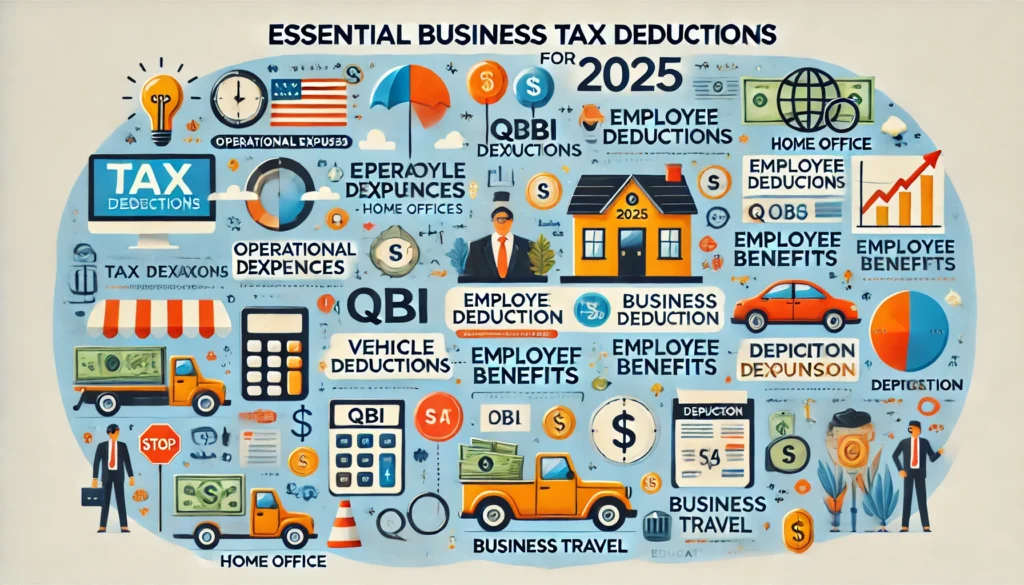The Ultimate Guide to Business Deductions for 2025: Don’t Leave Money on the Table!
Every dollar saved in taxes is a dollar you can reinvest in your business. With constantly evolving tax laws, knowing the ins and outs of business deductions in 2025 is crucial for maximizing profits and minimizing your tax burden. This comprehensive guide will cover the most critical deductions your business should leverage.

1. Operational Expenses
These are ordinary and necessary expenses incurred to operate your business:
- Rent and utilities
- Office supplies
- Business insurance
- Advertising and marketing
Tip: Track these expenses carefully using accounting software to ensure accurate reporting.
2. Home Office Deduction
With more businesses operating remotely, this deduction is more valuable than ever:
- Deduct a percentage of rent, mortgage, utilities, and maintenance proportional to the space dedicated to business use.
Tip: The area must be exclusively used for business. Take pictures and maintain floor plans to document the space.
3. Vehicle Expenses
Two methods to choose from:
- Standard Mileage Rate: $0.63 per business mile driven in 2025.
- Actual Expense Method: Include fuel, repairs, insurance, and depreciation.
Tip: Keep a meticulous mileage log to substantiate your claim.
4. Qualified Business Income (QBI) Deduction
Businesses structured as sole proprietorships, partnerships, S corporations, and LLCs may deduct up to 20% of qualified income.
Tip: Consult with a CPA to ensure eligibility and optimization of this significant deduction.
5. Employee and Benefit Expenses
Costs related to employee compensation and benefits are deductible:
- Wages and salaries
- Bonuses
- Health insurance
- Retirement contributions
Tip: Consider offering qualified retirement plans to enhance deductions and employee satisfaction.
6. Professional and Legal Fees
All professional services needed to run your business qualify:
- Legal consultations
- Accounting and bookkeeping
- Financial advising
Tip: Separate personal and business advisory fees clearly to avoid disqualification.
7. Depreciation and Section 179
Write off the cost of tangible business assets like equipment, machinery, and furniture.
- Section 179 allows an immediate expense deduction of up to $1.25 million for qualifying equipment in 2025.
Tip: Strategically plan purchases to maximize your deduction each year.
8. Business Travel and Meals
Travel-related expenses like flights, hotels, and rental cars are deductible if business-related.
- Meals are 50% deductible if associated with conducting business.
Tip: Maintain detailed receipts and document the business purpose of every trip and meal.
9. Education and Training
Expenses for continuing education, workshops, or training relevant to your business are deductible:
- Courses
- Seminars
- Certifications
Tip: Keep records of course content and how it directly relates to your business activities.
10. Interest Expenses
Interest on loans or credit lines used for business purposes is deductible.
Tip: Clearly separate business and personal loans to ensure proper deduction.
11. Startup Costs
New businesses can deduct up to $5,000 of startup expenses immediately, with the remaining amortized over 180 months.
Tip: Organize your records early to maximize initial deductions.
12. Retirement Contributions
Contributions to retirement accounts for yourself and employees can significantly reduce taxable income:
- SEP-IRAs
- SIMPLE IRAs
- Solo 401(k)s
Tip: Maximize contributions to receive immediate tax savings and grow your retirement fund tax-deferred.
13. Bad Debt Deductions
Write off unpaid accounts receivable as business losses.
Tip: Regularly review outstanding debts and document efforts to collect.
14. Environmental and Energy-Efficient Incentives
Businesses making energy-efficient improvements or engaging in sustainable practices may qualify for additional deductions or credits.
Tip: Research federal and state incentives to fully capitalize on available savings.
Final Thoughts
Maximizing your business deductions isn’t just about compliance—it’s about smart financial strategy. By taking advantage of every applicable deduction, you can reinvest significantly more into your business’s growth and success.
Navigating complex tax deductions requires expertise. At CR Tax Advisors, we’re here to help you uncover every available deduction. Schedule your free discovery call today, and don’t leave a dollar on the table!